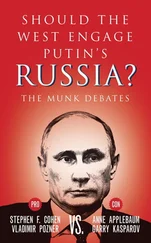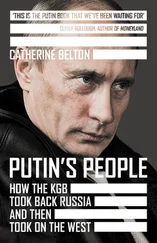One thing is, however, certain. No one had a vision for post-Soviet life apart from generalizations about constitutions, human rights, and free markets. But what actual policies to pursue, what flag should be saluted, what anthem sung, what holidays and heroes celebrated, what icons should be smashed and which new ones created, no one had the slightest idea.
* * *
Survival needs no justification, but tribulation is always easier to bear in the name of something higher. For Russians that has traditionally been what they themselves call “the Russian Idea,” meaning a sense of national identity and purpose crystallized into a specific vision and a way of life. The Russian Idea also has a a quasi-mystical nationalistic aura about it, “the conviction that Russia has its own independent, self-sufficient and eminently worthy cultural and historical tradition that both sets it apart from the West and guarantees its future flourishing,” wrote Tim McDaniel in The Agony of the Russian Idea . [208] Tim McDaniel, The Agony of the Russian Idea (Princeton, N.J.: Princeton University Press, 1996), p. 10.
The Russian sense of national self, like the history that produced it and the history it produces, clearly tends toward the extremes rather than to cluster around some middle point. The country’s greatest twentieth-century philosopher, Nikolai Berdyaev, wrote in his book The Russian Idea :
The Russians are a people in the highest degree polarized: they are a conglomeration of contradictions. One can be charmed by them, one can be disillusioned. The unexpected is always to be expected from them…. In respect of this polarization and inconsistency the Russian people can be paralleled only by the Jews: and it is not merely a matter of chance that precisely in these two peoples there exists a vigorous messianic consciousness…. Never has Russia been bourgeois.” [209] Nikolai Berdyaev, The Russian Idea (Hudson, N.Y.: Lindisfarne Press, 1992), pp. 20–21.
And another philosopher, V. M. Mezhuev, put it another way: “We are not suited for moderation and measure, which are the marks of rationality.” [210] McDaniel, The Agony of the Russian Idea , p. 36.
In the view of these two philosophers the Russian collective psyche keeps its balance by going from one extreme to the other, rather than by seeking a midpoint. This makes Russia both fragile and tenacious, able to survive any ordeal, but unable to construct states that do not sooner or later implode. To some extent, it is precisely that fear of the tendency to fly off to extremes that causes Russians to create rigid hierarchical states that in time ossify and break apart to release the very forces they were created to contain.
Out of the thousands of signs, markers, and symbols of a national identity, anthem and flag have to rank high. A piece of decorated cloth, a few minutes of music, might not seem important in and of themselves, but their lack, or, as in Russia’s case, their presence in a stunted form, is indicative of a profound malaise, a failure to achieve integrity, that touches every schoolchild who must salute the flag and sing the national anthem.
The Bolsheviks had a flag and a song. Post-Soviet Russia really has neither. Instead of creating a flag as new as the new Russia, the government adopted a tricolor from the late tsarist period. From top to bottom it is white, blue, and red. Whether there’s any subliminal significance to the counterrevolutionary white being on top with the revolutionary red on the bottom is anybody’s guess. To provide some aesthetic/emotional continuity the music of the Soviet anthem was kept, but the words were rewritten. Lenin was now tossed out as Stalin had been in an earlier rewrite. God, however, is back.
But these are very new and still raw “traditions.” It means that parents and children will have grown up saluting different flags, singing different anthems.
There is a similar problem with holidays. Victory Day, May 9, celebrating the defeat of Nazi Germany, and New Year’s are the only holidays that provide some kind of continuity with the Soviet past. Though a large portion of the population is Russian Orthodox, many Russians aren’t religious, and there are also ten to fifteen million Muslims in Russia, not to mention Jews and Buddhists. No holiday with a religious tinge can become truly national.
For schoolchildren there’s not only the problems of flag and anthem but the problem of what history they’re taught. As it used to be said with a more sinister tone in Soviet times, it’s even harder to predict the past than the future.
The question remains—how to integrate the Soviet past into the post-Soviet present, what sense to make of it. “Russia should not repent for Soviet history,” said Duma Speaker Sergei Naryshkin. [211] Alexei Pankin, “Trying to Remain Moral Amid ‘Dom 2’,” Moscow Times , July 8, 2013.
Others would vehemently disagree.
Principally, the issue revolves around the image of Stalin, an icon that has been neither utterly smashed nor quite restored to a place in a new pantheon.
The Germans “lucked out” with Hitler. He was so evil, so destructive, and so unsuccessful that it was easy to reject him completely. But the Russians were not so lucky with Stalin.
Tomes have been written comparing the two great dictators, but in the end what matters most is their differences. The main difference is that in World War II Hitler lost and Stalin won. That meant suicide for Hitler and the Nuremburg trials for his high command. For Stalin, it meant the spoils and honors that come with being the victor, not least of which was a seat on the United Nations Security Council.
Russians are of course aware of the cost of Stalin’s Gulag, which the historian Norman Davies says “accounted for far more human victims than Ypres, the Somme, Verdun, Auschwitz, Majdanek, Dachau and Buchenwald put together.” [212] Foreword by Norman Davies in Tomasz Kizny, Gulag (Richmond Hill, Canada: Firefly, 2004), p. 9.
But Stalin himself knew such comparisons carry little weight, supposedly saying: “One death is a tragedy, a million is a statistic.”
Stalin’s terror ended with his death, but his achievements live on after him. Those achievements include the industrialization of Russia, the defeat of the Nazi invader, making his country an atomic superpower. One of the worst mass murderers in history had atomic weapons for five years and never came close to using them. The crisis occurred with his successor, the more liberal, humane, anti-Stalinist Nikita Khrushchev.
There are other of Stalin’s achievements that continue to elicit admiration: the Moscow Metro, a wonder of the world, and the many solid residential buildings, which were much better constructed than those of his successors, especially Khrushchev. Perhaps the best recommendation for a building is that it was constructed in Stalin’s time by German POW slave labor.
Even the seven sisters, the Soviet wedding-cake high-rises that dominate the Moscow skyline, which seemed grim and overbearing in Soviet times, have now acquired a sort of retro imperial chic. In fact at least two of the more daring new buildings shaping the contemporary Moscow skyline deliberately echo their shape.
Stalin’s name still has magic power whether it is invoked with hatred or respect. In 1956 Khrushchev banned Stalin’s name from the national anthem. Later, to be on the safe side, all the lyrics were removed, and for more than twenty years the Soviet Union’s national anthem was a song without words. When the new version appeared in 1977 the lines
Stalin reared us on loyalty to the people.
He inspired us to labor and heroic deeds.
Читать дальше
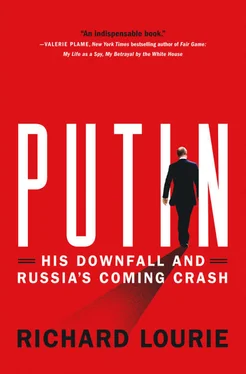

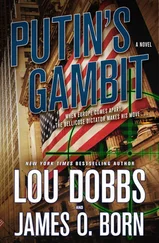
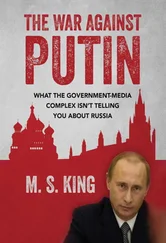
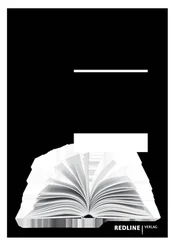
![Stephan Orth - Behind Putin's Curtain - Friendships and Misadventures Inside Russia [aka Couchsurfing in Russia]](/books/415210/stephan-orth-behind-putin-s-curtain-friendships-a-thumb.webp)

